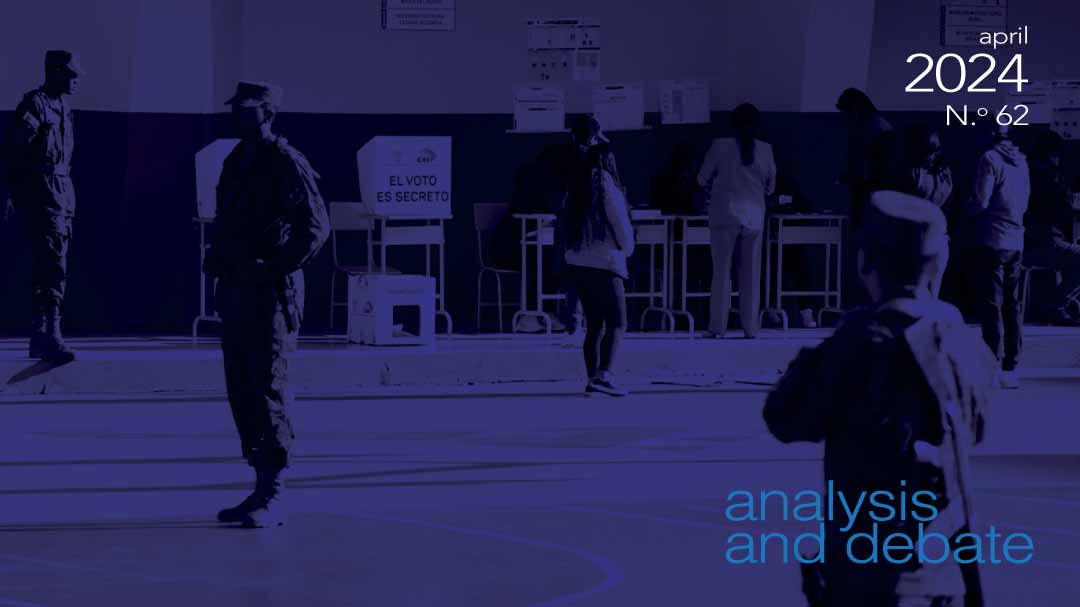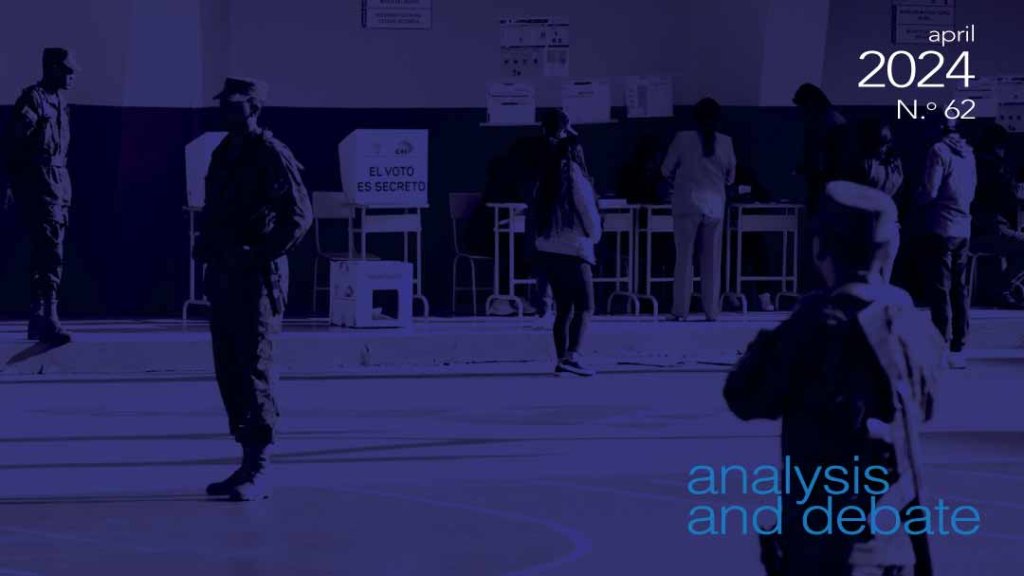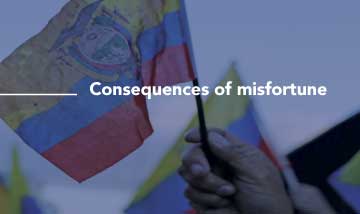Luis C. Córdova[1]
Summary: Ecuador returns to the polls in April to vote on a referendum proposed by the Daniel Noboa administration. Unlike other political-electoral junctures, on this occasion, the contenders are not clearly visible, nor does the content of the questions seem to sufficiently excite voters. At first glance, the escalating violence (social, political, and criminal) has tampered prospects for the working class target voters, while the elites representing financial, rentier, and agro-industrial capital, and those representing criminal capital, have a dynamic interaction in play as part of their efforts to maintain their stakes in power. The political-ideological disarmament has much to do with the military strategy adopted since the declaration of the domestic armed conflict on January 9, as it does with the incapacity of the left to dispute the meanings that are constructed as part of a war scenario. How, then, to take a stand against the April referendum? Here it is argued that one option is to rethink security as a political field, which should and can be contested.
![]() Download Security as a Political Field: How to Take a Stand against the April Referendum?
Download Security as a Political Field: How to Take a Stand against the April Referendum?
Ecuador returns to the polls on April 21 to vote on eleven questions: five classified as referendum or constitutional amendment questions, and six popular consultation questions.[2] In total, eight questions are related to security, which shows the importance of the topic when it comes to the perception of citizens and in the political agenda. Of these, three questions deserve more attention.
The first seeks to give constitutional validation to military presence in policing tasks. Already in 2015, the Rafael Correa administration introduced a similar reform through the National Assembly. Three years later, the Constitutional Court struck it down. Since then, each administration in power has applied what are called “states of exception” to take the military out of their barracks and put them onto the streets. If this question is approved, the militarization of public security will have constitutional protection.
Another constitutional amendment has to do with the extradition of Ecuadorians. Though currently prohibited, extradition is a centerpiece of the “war on drugs” that Washington has been promoting for 50 years. Over time, despite the fact that extradited drug traffickers have learned to manipulate the US justice system (Delgado et al., 2021), in Ecuador it continues to be promoted as a magic bullet. In last year’s referendum (05/02/2023), a similar question was already posed and did not obtain majority support. However, pressure from the U.S. Embassy has made recycling this question possible.
However, the most troubling question is the following:
“Do you agree that weapons, their parts or pieces, explosives, ammunition or accessories that were instruments and material objects of a crime, may be destined to the immediate use of the National Police or the Armed Forces, reforming the Organic Integral Criminal Code as set out in the Annex to the question?”
This reform reduces the possibility of being able to identify who is committing murders: whether an agent of the State or a common criminal. This means that a new outlook of
political-criminal violence is on the horizon: one of paramilitarism.
Last year, Guillermo Lasso had already relaxed rules on the possession and carrying of weapons for civilians, stimulating both legal importation of weapons and their trafficking. Now, the idea is for security forces to take advantage of black market technological advantages in weapons, ammunition, and explosives to take on criminal groups. With this question, arms manufacturers and traffickers are licking their lips.
Seen in this perspective, the referendum has a dual political purpose. On the one hand, they seek to further militarize public security. This process began in 2012, during the Rafael Correa administration; but it took on another dimension during the Lenín Moreno (2017-2021) administration, under the zealous tutelage of the United States Embassy
(Córdova, 2024).
On the other hand, the attempt is being made to defuse the process of capital accumulation through mega-mining, agribusiness, the installation of special economic zones and green extractivism, all in the name of the energy transition of the global north. Two referendum questions point in this direction: one introducing an hourly labor contract and another liberalizing international arbitration.
A close look at the public statements made by business associations, their representatives in formal politics, the reports of the International Monetary Fund, and the speeches of the head of the U.S. Southern Command leave little room for doubt.
For the bloc holding power, howsoever still weak in electoral terms, the April referendum comes as an opportunity to consolidate that power. If they win, not only will they multiply their chances in the 2025 elections, but the most predatory policies against the public interest can be implemented during the remainder of Noboa’s administration.
The backdrop is the fight against “organized crime,” “terrorists,” or “narco-terrorism.” These labels identify the enemy to be defeated, but their content is so ambiguous that it allows for an extensive and arbitrary interpretation. That is why it was not difficult for the October 2019 and June 2022 demonstrations, led by the indigenous and peasant movement, to be attributed to drug trafficking and organized crime in a single stroke.
The manipulation of (dis)affections must be added to this. As affections have no vocabulary and are expressed through aesthetic representations, the violent rituals of criminality incapacitate the population and make it easier to emotionally control them through fear: fear of chaos, fear of the Mexican narcos, fear of Venezuelan immigrants, fear of foreigners. Fear of blacks, fear of indigenous people, fear of one’s own neighbor. Prison massacres, selective assassinations, or disappearances are part of this nomenclature of horror that is shaping a subjectivity conducive to militaristic responses throughout Latin America.
What gives meaning to contemporary militarism in the region is a metaphysics of order based on the political philosophy of Thomas Hobbes. The core of his approach is that in the face of an “existential threat” to state security, there is no alternative but one resembling a Leviathan (Neal, 2019). Thus, calling in the military to restore order by force becomes an “existential necessity.”
In this context is only natural that military and civilians with militarized discourses speak of “organized crime” or “narco-terrorists” as an “existential threat” to the State. Taking them out – the bad guys – is a matter of life and death. In Ecuador, for example, it is common to hear phrases like this: “We have lost sovereignty in the country’s prisons”; which makes military intervention of the military
penitentiary system socially tolerated. Following this reasoning: who could oppose the militarization of public security, if it is an existential necessity to restore order? This rhetorical formula underpins the April referendum and the regime’s military strategy.
As can be seen, in this “logic of security,” politics is a substitute for war. Politics becomes war by other means. Therefore, there is no room for difference, for discrepancy, or for conflict. “Citizens’'” lives depend on the death of “narco-terrorists” and all of their allies, accomplices, and accessories. A permanent state of war is inaugurated that restricts democracy to the point of starvation.
The power coalition represented in Daniel Noboa’s administration seeks, through the April referendum, to sacralize this biopolitical context. Therefore, it is essential to contest its outcome. How can this be done? By changing the coordinates of discourse and collective action. That is, thinking of security as a political field that can and should be contested.
There is no doubt that citizen protection is a basic public good for the exercise of
other rights. Without minimum individual safety conditions, children and adolescents would not even be able to go to school. For this reason, protection is an essential task of any democratic political community (González, 2020). In theory, this political community is endowed with a state apparatus in charge of guaranteeing it by monopolizing the use of force.
In practice, this is not the case. The State’s coercive apparatus distributes protection and repression based on a given socioeconomic structure. In those areas where inequalities are chronic, there is likely to be more repression than protection, preserving these asymmetries.
It all depends on how political economies are configured at the local level: what kind of agreements (formal and informal) businessmen and government authorities establish to define protection priorities or repression objectives, and what kind of actors are involved in providing security: police, military, intelligence services, “municipal police “, private security guards, or the paramilitary.
From this perspective, illegal economies allow the reproduction of capital by extracting rents from the State (through corruption in public procurement), from natural resources (through illegal mining or trafficking of species), and from the population under its control (through extortion and kidnapping), as required. Criminal capital has always been functional to capitalism and organized crime has been a consubstantial part of the construction of the modern state (Andreas, 2013; Mandić, 2021; Paley, 2014).
The criminal groups that strive to monopolize these markets would not be able to do so without the participation of state agents who provide them with mafia-like protection to
carry out their misdeeds. The weapons and ammunition locked in the office of the director of the regional prison of Guayaquil are proof of this (El Universo, 2023). Sabotage of the radar system located on the hill of Montecristi, under military custody, which occurred on November 7, 2021, is another eloquent example (Mendoza, 2023). The allocation of banana export quotas to shell companies by Ministry of Agriculture officials in the notorious narco-banana industry (Manrique, 2023) removes all shadow of a doubt.
Conceiving security as a political field requires a dynamic positioning against official theories. However, it also requires an understanding of the relational nature of security. Here, it is no longer a question of defending the security of an idyllic state, but of recovering the conditions for life in community to be possible. It is the political community -diverse, heterogeneous and molecular- which, by ensuring decent conditions for social coexistence, achieves integral security. Without political community, no sovereignty is possible. The legitimacy of the State is born therefrom and also from the loyalty of its citizens.
At the grassroots, urgency comes in disputing the sense of order with which war capitalism is legitimized. It is urgent to vindicate the possibility of conflict as a mechanism for social change. But, above all, it is urgent to recognize the cultural landscape that provides the aesthetic representations with which children and adolescents are imagining their individual futures (Lechner, 2015). Which are are the images through which the individual recognizes himself as such? What are the collective imaginaries to give meaning to new ways of coexisting? It is within the social fabric that the first battle within the political field of security must be won.
References
Andreas, P. (2013). Smuggler Nation. How illict trade made America. Oxford University Press.
Córdova, L. (2024). Proxy wars en los Andes. ¿Cómo Estados Unidos moldeó la estrategia militar y la política económica del ‘nuevo Ecuador’? Estados Unidos en la mira 2. 24 de febrero. https://
ordenconflictoyviolencia.files.wordpress.com/2024/02/eeuu_02-1.pdf
Delgado, A., Ftzpatrick, B., Hall, K. G., Rodríguez, L., Weaver, J., y Verdad Abierta. (2021). Cómo los jefes de los carteles están manipulando el sistema de justicia de Estados Unidos. Una guerra adictiva. 50 años combatiendo las drogas. 13 de diciembre. https://una-guerra-adictiva.
elclip.org/como-jefes-de-carteles-estan-manipulando-el-sistema-de-justicia.html
El Universo. (2023). ¿Qué dice el SNAI tras hallazgo de armas en tumbado de oficinas administrativas de cárcel de Guayaquil? El Universo. August 5. https://www.eluniverso.com/noticias/seguridad/armas-halladas-en-oficinas-snai-carcel-
guayaquil-nota/
González, Y. M. (2020). Authoritarian Police in Democracy. Cambridge University Press. https:
//doi.org/10.1017/9781108907330
Lechner, N. (2015). La trama social como paisaje cultural. En, Obras. Tomo IV Política y Subjetividad 1995-2003 (pp. 129–144). Fondo de Cultura Económica / Facultad Latinoamericana de Ciencias Sociales sede México.
Mandić, D. (2021). Gangsters and Other Statesmen Mafias, Separatists, and Torn States in a Globalized World. Princeton University Press.
Manrique, A. (2023). Narcobanano. El sistema bananero ecuatoriano, una puerta abierta al narcotráfico. https://www.connectas.org/especiales/narcobanano/
Mendoza, B. (2023). Radar de Montecristi: 13 militares son acusados de cometer sabotaje. Primicias. June 11. https://www.primicias.ec/noticias/en-exclusiva/radar-montecristi-contraloria-fiscalia-investigan-explosion/
Neal, A. W. (2019). Security as politics : beyond the state of exception. Edinburgh University Press Ltd.
Paley, D. (2014). Drug War Capitalism. AK Press.
[1] Luis C. Córdova A. D. in Comparative Politics from the University of Salamanca. Director of the Research Program on Order, Conflict and Violence at the Universidad Central del Ecuador. He researches political and criminal violence, civil-military relations, and foreign policy. ORCID 0000-0001-9948-6992 E-mail: lcordova@uce.edu.ec
[2] Here you can read the 11 questions: https://www.cne.gob.ec/consulta-popular-y-referendum-2024/




